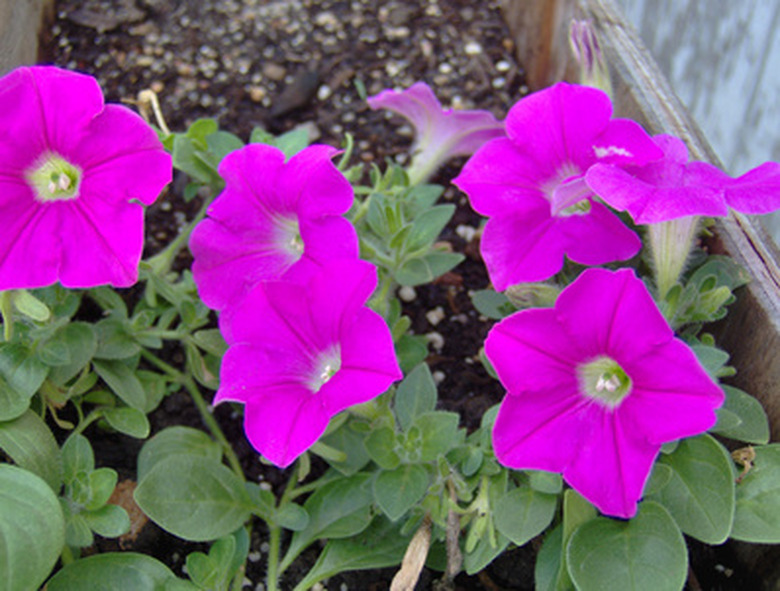What Causes Petunias To Die Or Not Thrive?
What would a summer garden be without at least one petunia? An annual, meaning that it completes its life cycle in one growing season, it grows quickly to flower and produce seeds before withering away. If inhospitable growing conditions exist or a petunia plant is attacked by pest or disease, it will falter.
Lack of Light
Petunias need sunlight in order to grow robustly. At least four hours of direct sunlight daily will sustain healthy foliage and more than four hours of sunlight ensures lots of flowers. If a petunia is growing in bright indirect light, or in too much shade, stems become leggy, leaves few and yellow, and flowering is rare.
Improper Soil Moisture
Having a fibrous root system, petunias need a consistently moist soil to grow. Extremes in soil moisture leads to plant failure. Soggy, flooding soils suffocate the roots and can lead to fungal diseases, whereas a dry soil causes wilting and leaf and flower abortion. Sandy soils drain and dry out more quickly than loam or clay-based soils.
- What would a summer garden be without at least one petunia?
- Having a fibrous root system, petunias need a consistently moist soil to grow.
Soil Fertility
Petunias do not require a lot of fertilizer, and any average garden soil should provide ample nutrition for a plant to grow nicely. Supplemental applications of fertilizers that have a good amount of potassium improve hardiness of petunias. Petunias grown in sandy soils may diminish more quickly because nutrients from organic matter such as compost or manure or from fertilizer feedings leach quickly after rains. Nutrients tend to remain available to roots longer in loam and clay soils.
Temperature
Petunias are warm-season plants and prosper when temperatures are above 75 degrees Fahrenheit. They are killed by frosts and freezes. Excessive summer heat, such as in the American Deep South or American Southwest can also cause petunias to wither prematurely. Prolonged temperatures above 90 degrees increase water needs, and if not met will cause leaves to dry out. Partial shade in some hot conditions can prolong the life of the petunia for several weeks. Too much intense heat and humidity in summer can also lead to a petunia's demise.
- Petunias do not require a lot of fertilizer, and any average garden soil should provide ample nutrition for a plant to grow nicely.
- Prolonged temperatures above 90 degrees increase water needs, and if not met will cause leaves to dry out.
Pest or Disease
Insect pests tend to affect petunias that are stressed, usually triggered by improper watering, no sunlight or lack of fertile soil. Aphids, caterpillars and leaf miners eat petunias. These same environmental conditions can lead to diseases that will diminish the vigor of the petunia. Wet soils coupled with high humidity often causes gray mold, bacterial soft rot, leaf spot, mosaic virus and necrotic spot virus.
End of Life Cycle
As an annual, a petunia will naturally begin to slow or cease growth and flowering once it has set seed. This completes the life cycle of the mother plant and it is destined to die, even if all other factors for growth remain good. Rarely will a petunia remain vibrant longer than 12 to 18 months. It needs replacement with a new seedling plant. Sometimes a severe pruning rejuvenates vigor for a few months longer.
- Insect pests tend to affect petunias that are stressed, usually triggered by improper watering, no sunlight or lack of fertile soil.
References
- "A-Z Encyclopedia of Garden Plants"; Edited by Christopher Brickell and H. Marc Cathey; 2004
- Univ. of Minnesota Extension: Growing Petunias
- Floridata: Petunia x hybrida
